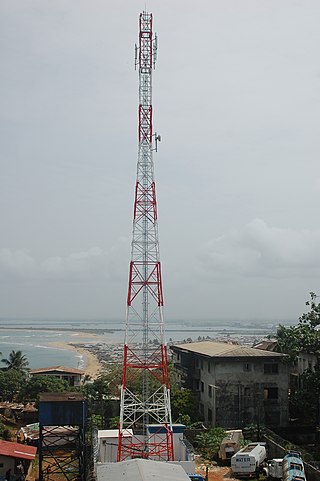
Telecommunications in Cambodia include telephone, radio, television, and Internet services, which are regulated by the Ministry of Posts and Telecommunications. Transport and posts were restored throughout most of the country in the early 1980s during the People's Republic of Kampuchea regime after being disrupted under Democratic Kampuchea.
Telecommunications in Eritrea are under the authority of the Government of Eritrea.
Telecommunications in Ethiopia is a monopoly in the control of Ethio telecom, formerly the Ethiopian Telecommunications Corporation (ETC). As of 2012, 20.524 million cellular phones and 797,500 main line phones were in use.

Mass media in Liberia include the press, radio, television, fixed and mobile telephones, and the Internet.
Myanmar has begun the liberalization of its Telecommunication market in 2013.
Telecommunications in Pakistan describes the overall environment for the mobile telecommunications, telephone, and Internet markets in Pakistan.
Telecommunications in the Philippines are well-developed due to the presence of modern infrastructure facilities. The industry was deregulated in 1995 when President Fidel Ramos signed Republic Act No. 7925. This law opened the sector to more private players and improved the provision of telecom services are better and fairer rates, leading to the creation of many telecommunication service providers for mobile, fixed-line, Internet and other services.

The telecommunication infrastructure of Singapore spans the entire city-state. Its development level is high, with close accessibility to the infrastructure from nearly all inhabited parts of the island and for all of the population, with exceptions. Today, the country is considered an international telecommunications hub, an achievement that was driven by Singapore's view that high-quality telecommunications is one of the critical factors that support its economic growth.
Telecommunications in Slovakia includes fixed and mobile telephones, radio, television, and the Internet.
Telecommunications is one of the most modern, diverse and fast-growing sectors in the economy of Ukraine. Unlike country's dominating export industries, the telecommunications, as well as the related Internet sector, remain largely unaffected by the global economic crisis, ranking high in European and global rankings.

Telecommunications in Azerbaijan provides information about television, radio, fixed and mobile telephones, and the Internet in Azerbaijan. The Azerbaijan economy has been markedly stronger in recent years and, not surprisingly, the country has been making progress in developing ICT sector. Nonetheless, it still faces problems. These include poor infrastructure and an immature telecom regulatory regime. The Ministry of Communications and Information Technologies of Azerbaijan (MCIT), as well as being an operator through its role in Aztelekom, is both a policy-maker and regulator.

Telecommunications in Armenia involves the availability and use of electronic devices and services, such as the telephone, television, radio or computer, for the purpose of communication. The various telecommunications systems found and used in Armenia includes radio, television, fixed and mobile telephones, and the internet.
The liberalization of Bangladesh's telecommunications sector began with small steps in 1989 with the issuance of a license to a private operator for the provision of inter alia cellular mobile services to compete with Bangladesh Telegraph and Telephone Board (BTTB), the previous monopoly provider of telecommunications services within Bangladesh. Significant changes in the number of fixed and mobile services deployed in Bangladesh occurred in the late 1990s and the number of services in operation has subsequently grown exponentially in the past five years.

Nepal Doorsanchar Company Ltd., popularly known as Nepal Telecom or NTC, is a state-owned telecommunications service provider in Nepal with 91.49% of the government share. The company was a monopoly until 2003 when the first private sector operator United Telecom Limited(UTL) started providing basic telephony services. The central office of Nepal Telecom is located at Bhadrakali Plaza, Kathmandu. It has branches, exchanges and other offices in 184 locations within the country.

Ethio telecom, previously known as the Ethiopian Telecommunications Corporation, is an Ethiopian telecommunication company serving as the major internet and telephone service provider. Ethio telecom is owned by the Ethiopian government and maintains a monopoly over all telecommunication services in Ethiopia. Based in Addis Ababa, it is one of the "Big-5" group of state owned corporations in Ethiopia, along with Ethiopian Airlines, the Commercial Bank of Ethiopia, Ethiopian Insurance Corporation, and the Ethiopian Shipping Lines.
The Wefri Warsay Yika'alo (WWY) or Warsay Yika'alo Program of Eritrea is an ambitious project of post-war recovery. It is similar to other economic recovery programs and is often compared to the Marshall Plan.1, 2, 3
Articles related to Eritrea include:
Telecommunications in Angola include telephone, radio, television, and the Internet. The government controls all broadcast media with a nationwide reach.
3G mobile telephony was relatively slow to be adopted globally. In some instances, 3G networks do not use the same radio frequencies as 2G so mobile operators must build entirely new networks and license entirely new frequencies, especially so to achieve high data transmission rates. Other delays were due to the expenses of upgrading transmission hardware, especially for UMTS, whose deployment required the replacement of most broadcast towers. Due to these issues and difficulties with deployment, many carriers delayed acquisition of these updated capabilities.
TelOne Zimbabwe is a parastatal telecommunications company owned by the Zimbabwe government headquartered in Harare's Central Business District. It is the largest telecom entity in Zimbabwe and has the second largest fixed-line network in Southern Africa after Telkom South Africa. The parastatal is Zimbabwe's sole fixed landline services provider.







